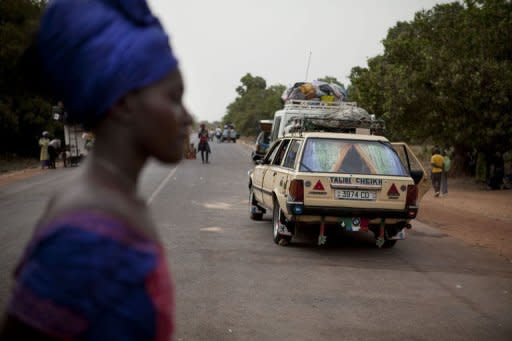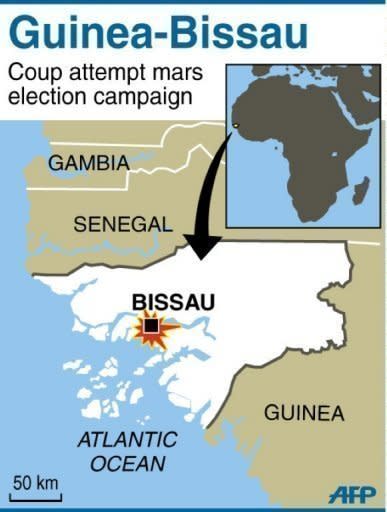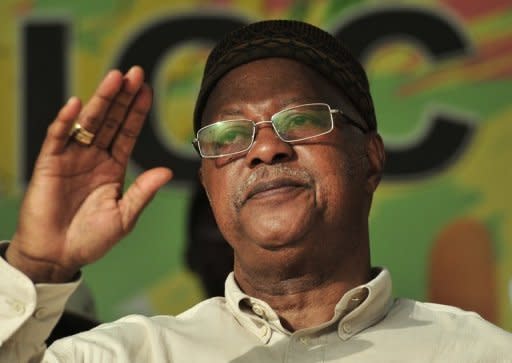Guinea-Bissau parties mull post-coup government
Opposition parties in Guinea-Bissau were to meet on Saturday to thrash out a "unity government" after a military coup derailed presidential elections. The talks at the national assembly, exclude the toppled African Party for the Independence of Guinea-Bissau and Cape Verde (PAIGC), whose leaders have been arrested or have fled following the Thursday putsch. Amid growing international condemnation, the coup leaders on Friday set out terms for the "unity government," notably demanding the defence and interior portfolios. They also imposed an overnight curfew, called on members of the toppled government to surrender and confirmed that private radio stations had been shut down. Early Saturday the capital Bissau was quiet, with the military presence markedly lower than it was on Friday, when heavily armed soldiers patrolled the streets. Troops could be seen outside public buildings and the PAIGC headquarters. The UN Security Council condemned the military action and urged an immediate return to civilian rule, while the United States, Canada and Nigeria were among others joining the chorus of condemnation of the coup. Washington also issued a travel warning for Guinea-Bissau, urging American citizens "to shelter in place and avoid the downtown area of Bissau." The African Union's commission chief Jean Ping condemned the "outrageous acts which undermine the efforts to stabilise the situation in Guinea-Bissau and tarnish the image of the country and Africa." West African regional group ECOWAS, still grappling with a putsch and rebellion in nearby Mali, also condemned the coup. Guinea-Bissau army chiefs summoned the leaders of the main political parties apart from PAIGC on Friday asking them to begin thinking about forming a new government. "The soldiers told us ... to think about a government of national unity and its composition," one party leader, who requested anonymity, told AFP after the closed-door meeting at the former military headquarters in a southern suburb of Bissau. Chief-of-staff General Antonio Indjai was among those who attended, although it was later announced that he had been stripped of his post. Deposed prime minister Carlos Gomes Junior, the favourite to win the presidency in a second-round run-off set for April 29, was seized in an assault on his home using rocket-propelled grenades. The military also captured interim president Raimundo Pereira. "The army confirms it has deposed the interim president Raimundo Pereira, the prime minister Carlos Gomes Junior and the army chief-of-staff General Antonio Indjai," the ruling "military command" said in one of its statements on Friday. "The three are safe and sound and are under the control of the army," it said. Indjai himself seized the post from his predecessor Jose Zamora Induta in an army mutiny in June 2010. At the time he was serving as his deputy. Gomes had garnered 49 percent of the vote in the first round of the election on March 18 and campaigning for the second round was due to start Friday. But on Thursday evening, soldiers armed with rocket-propelled grenades and Kalashnikov rifles launched their power grab. Gunfire and ambulance sirens echoed through a city plunged into darkness as electricity was cut off. Troops seized the PAIGC headquarters and the state radio station. The coup leaders initially stated that they acted because of an alleged "secret deal" with Angola, which has 200 troops in the country to help reform the military. They feared the Angolan force was secretly being built up. Former colonial power Portugal, condemning the coup, rejected suggestions that there was anything untoward in the Angolan military presence. In the days leading up to the coup, there had been fears of unrest in Guinea-Bissau, which has already suffered half a dozen coups or attempted coups since 1980. Since independence in 1974, Guinea-Bissau's army and state have remained in constant, often deadly, conflict, and no president has ever completed a full term in office. Three have been overthrown and one was assassinated. The country has also become a hub for drug-running between South America and Europe.





